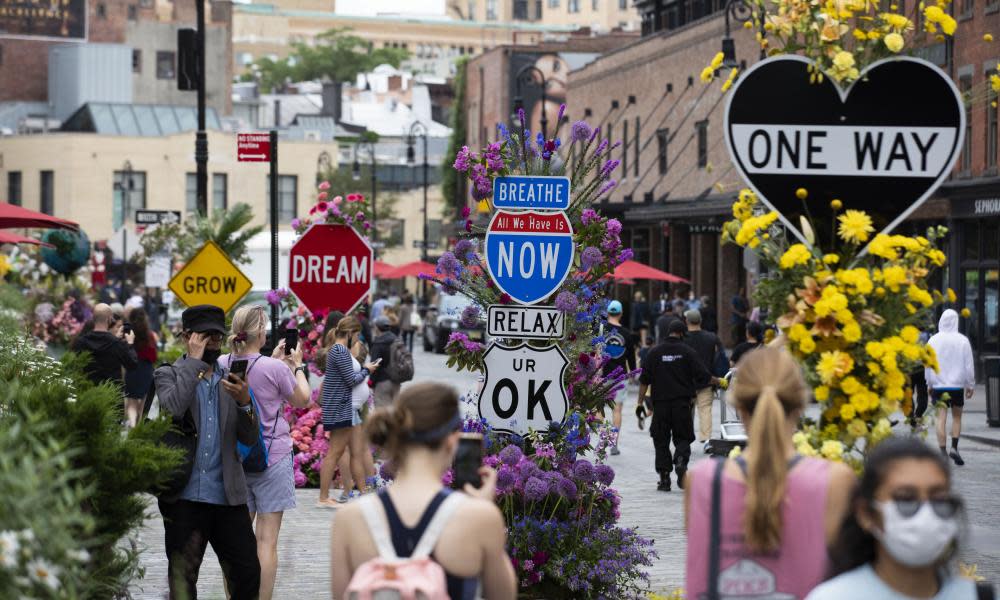Now Covid crisis mode is lifting, questions parked for a year are nagging once again

The weather is warm, and we’re heading into summer, with the assumption that this one will be better than the last: freer of lockdowns, less fraught with uncertainty and with a high probability that, when we come back in September, it will be to something like regular life. This is a great feeling in almost every way, except for a nagging anxiety – that, now the end is in sight and the limbo practically over, a reckoning is finally due.
The reflex to learn something from everything is, I guess, noble and human, but let’s face it, it’s also a pain in the arse. In New York at the moment, think pieces abound on how the city might come out of the pandemic a better, more equal place. Large thoughts attend patterns of work and how they may or may not have been permanently disrupted. These are worthwhile speculations at the social and political level, but at home, on the sofa, the creeping pressure to turn the pandemic experience into a spur for “growth” and renewal – in other words, to return to the pre-pandemic assumption that every life stage must be harnessed to rampant personal improvement – brings on a certain weariness.
Who have I become, and how is it better than who I was; and, dimly, how can I monetise that betterness? These questions, parked for a year in what might have been the one good aspect of our suspended animation, are now resurfacing with force.
It’s an intensified version of new year’s resolution thinking, if the new year came with an 18-month curfew and invitation to think a lot about dying. It is easier, perhaps, to work backwards and strike from the list all the ways in which we may not have changed, or rather may have changed for the worse. After a year of being stuck at home with no childcare, it’s safe to say I’m neither more patient nor less shouty. Nothing has improved on the home scheduling front; in fact, irregular bedtimes, longer screen time and more delivery food – all habits formed, or accelerated, in the past year – persist and prove difficult to break. A lot of people I know are suffering various shades of motivational crisis.
If there is a positive spin on these developments, it may have to do with entering a state of not caring so much about outcomes. Prior to the pandemic, I was accustomed to sweating every parenting decision, small and large, with enough energy to power a nuclear plant. This past year, however hard, has been an eye-opener in paediatric resilience. The kids went to school, stopped going to school, then went to a weird, cobbled-together learning centre where they were monitored by extremely nice staff with no experience whatsoever of childcare. Nonetheless, they seem fine. Clearly, in some circumstances, we worry too much.
Related: We’re almost close enough to touch freedom. But is the end of lockdown a mirage? | Zoe Williams
When all this started, we were supposed to grow kinder and more thoughtful to our neighbours and friends, and more prescient of who in society is essential. Already, it seems likely that this gratitude has faded; early data suggests that increased rates of tipping, for example, haven’t survived the pandemic. There is an ancillary question as to whether the disruption and fear of the past year makes us feel more grateful to be alive in ways too nebulous to measure; that post-pandemic, we are able to root ourselves more firmly in the present, because tomorrow never comes.
This sense of wonder is a desirable mindset that is also, in my experience, an extremely temporary expression of shock or some other trauma. The quickest way to feel profoundly grateful for what you have is to have something large taken away from you. It’s a gratitude that tends not to last. It is hard, after the death of a loved one or a serious illness of your own, to hang on to the desire, fervent in the moment, never to take anything for granted again. Eventually normality resumes. You return to being the person you were, occasionally grateful for sunlight on the garden, but more often not.
Crisis thinking serves a purpose; it coats everything in a layer of unreality that lets you transition away from the blast zone with a small amount of cushioning. It’s a mistake to imagine large, or even small, change will follow. There is something trite in there about the absence of teachable moments – of dropping the desire, after the pandemic, for everything we experience to serve some future utilitarian purpose – being the only lesson we need. But of course, this conclusion defeats the very point of thinking it.
Emma Brockes is a Guardian columnist based in New York

 Yahoo Movies
Yahoo Movies 
